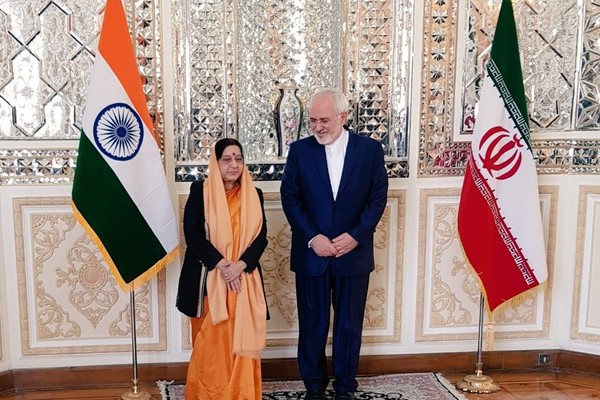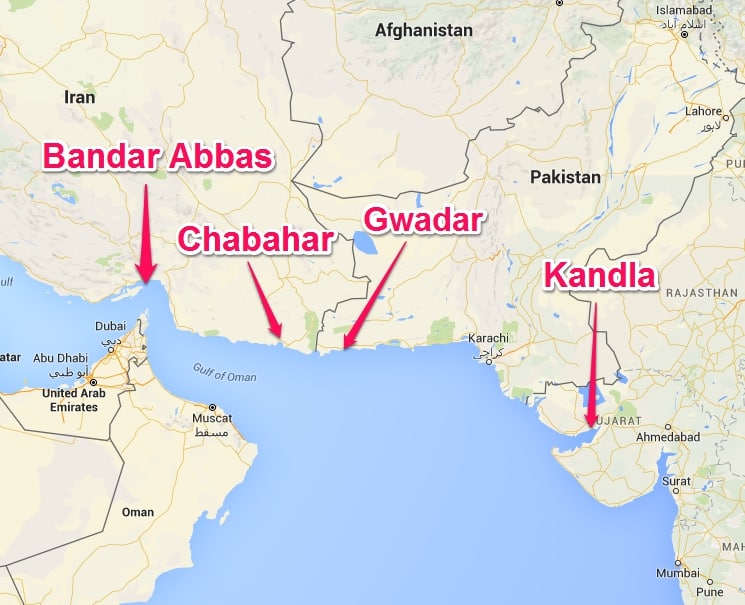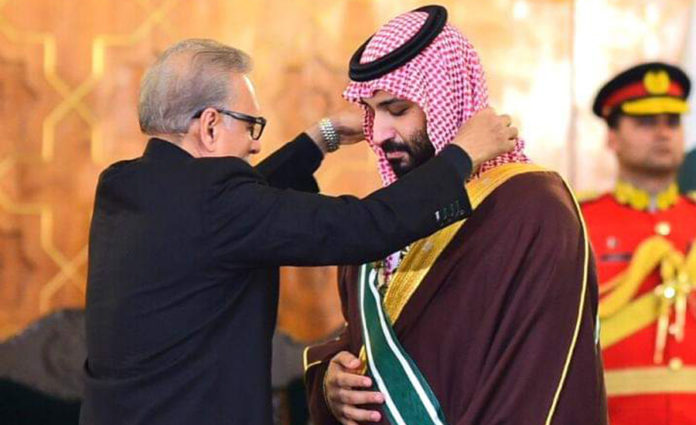The recent visit of Saudi Arabia’s crown prince to Pakistan with a big economic package worth $20 bn is considered as a game changer in regional politics. This was the second beigest gesture after Chinese President Xi’s visit in 2015 and announcing of China Pakistan Economic Corridor (CPEC). The Saudi-Pakistan relationship, which has been traditionally close and warm, is moving on to a new level of partnership. The Saudi investment decision can be taken as signifying a vote of confidence in the Pakistani economy as well as in the leadership. It comes on top of the $6 billion package that Saudi Arabia pledged last year to help Pakistan tide over its current economic difficulties.
Before the Mohammad Bin Salman visit, Saudi Arabia’s Energy Minister Khalid A Al-Falih arrived in Gwadar for inspection of the site allocated for a multibillion Saudi Aramco oil refinery in the port city worth $10 billion. Khalid al-Falih told reporters in Gwadar that Saudi Arabia wants to make Pakistan’s economic development stable through establishing an oil refinery and partnership with Pakistan in the CPEC. This highlights that Saudi Arabia is openly linking up with the CPEC which was welcomed by China.
Saudi Arabia is trying to diversify its external relations and responding to strategic paradigm shift after the Jammal Khashoggi incident by pivoting to Asia (China and Pakistan). Sufficient to say, under the circumstances, a China-Pakistan-Saudi axis has immense the potential to expand. The common benefits are trade, connectivity and geo politics. Most likely UAE will also follow suit by investing in CPEC after observing Saudi strategic move at Gwadar. The visit of UAE crown prince Sheikh Mohammad Bin Zaid Al- Nahyan to Pakistan was of course a significant signal in this regard.
Moreover, Malaysian Prime Minister Dr. Mahathir Mohammad is also visiting Pakistan on an official tour with a huge economic and investment package, the same gesture is expected by Turkish president Recep Tayyip Erdogan who is expected visit Pakistan within the next couple of months. This is a clear indication that Pakistan is being now seen as a huge opportunity in terms of investment due to CPEC related connectivity.
The Saudi crown prince also visited India the very next day after Pakistan’s visit. India tried its best to get something out of this visit to be used against Pakistan, but failed in doing so. Every level of Indian leadership raised the Pulwama incident to the Saudi delegation but their efforts failed at the end. This was very clear indication to Indians as to how Saudi Arabia views regional politics, especially in south Asia. Pakistan is the key strategic ally to Saudi Arabia along with historic Defence and economic relations. The gesture from Saudi crown prince to release the Pakistani prisoners on the request of Prime Minster Imran khan, from Saudi jails and reduction of Hajj visa fee are remarkable steps towards building new heights in bilateral relationship.
Iran, on the other hand did not look this development as a positive gesture keeping in view the Saudi-Iranian rivalry. The recent terrorist attacks on Iranian pasdaran e inqilab killing number of personnel incensed Iran and it blamed terror groups operating from Pakistani soil as being responsible for the attack. Amazingly a similar incident occurred at Pulwama in India Occupied Kashmir and almost the same tactics were used to destroy convoy of Indian CRPF buses killing 40 Indian soldiers. Indian foreign minister Sushma Swaraj rushed to Iran to get some leverage. The Iranian Pasdaran Chief used threatening language against Pakistan and the same language is being used by Indians since the Pulwama attacks. This indicates the machinations of Indian ambitions and conspiracies and how desperate India is to isolate Pakistan in the region and in the global arena.
Pakistan is using all channels to clarify Iran’s reservation and progress is being made in this regard. It is important for Iran not to play into Indian hands and try to engage with Pakistan through CPEC connectivity. India has a lot to lose in this game due to major players are looking at Pakistan as a favorable destination for connectivity investment. Countering the CPEC project the Modi regime came up with alternate Chahbahar project with Iran trying to undermine OBOR. But here, India has a big reason to feel worried that its Ratnagiri Chabahar Refinery project, which has been described as the “world’s largest refinery-cum-petrochemical project” is spluttering due to agitation by farmers against land acquisition. This project thus itself is facing troubles. The bigger reason of India’s worry is Saudi Arabia’s huge investment in Gwadar port under CPEC. With this Saudi investment, it is certain that Gwadar will take precedence over Ratnagiri. This is good news for Pakistan but at the same time it is a challenge due to Iran’s reservations.

Being a traditional rival of Saudi Arabia, Iran is watching the surge in Saudi-Pakistani alliance, specifically at the CPEC and Gwadar port investments. The Saudi presence in Pakistan’s border region with Iran (Gwadar port) has security implications from an Iranian viewpoint the Pasdaran bus attack is exactly what Iran referred due to Saudi presence in Pakistan.
Having said that, as I mentioned in my previous articles, Iran still has lot to contribute in the shifting paradigm associated with CPEC there is huge potential for trade increase and both countries agree to set up border crossings. Pakistan has identified five places for setting up trading centers along the Pak-Iran border, and the purpose of these common border markets is to sell goods at a concessional rate of customs duty and other taxes in order to control the growing cross border illegal trade. The biggest area where Iran has lot of room to play is the Pakistan Iran Gas Pipeline and upgradation of RCD highway stretching up to Turkey and Caucasus (Turkey Iran Pakistan Economic Corridor-TIPEC).
The Iran Pakistan Gas Pipeline project is under-construction which is a 2,775-kilometre pipeline to deliver natural gas from Iran to Pakistan and must be completed at any cost. This is a key and critical project for establishing strategic relations and enhancing economic cooperation between the two countries. It would ensure the supply of 750 million cubic feet of natural gas per day to Pakistan which is required to keep industrial and commercial wheel into perpetual motion. Even though Iran has to be dealt carefully due to imposed UN sanctions, Pakistan has to manage one way or another for execution of this project.
Moreover, Upgradation of RCD highway for Eurasian connectivity is another area where Iran can play an important role. The upgraded RCD can be converted to Turkey Iran Pakistan Economic Corridor with possibility to be connected further to CPEC and Gwadar. Efforts must be made to make it a viable project linking Pakistan, Iran, Turkey, and Azerbaijan into Caucasus and further central Asia and Eurasia for connectivity reasons. This way, all these countries that are already under ECO umbrella will come even closer and huge potential can be explored via re-investment on this RCD highway OR Turkey Iran Pakistan economic corridor (TIPEC) having unique connections with many seas, Persian Arabian gulf/ Arabian Sea, pivotal Caspian & Black Sea. This is food of thought for said country’s; policy makers and especially Iran. This possible corridor (TIPEC) having connection with CPEC will be a powerful economic and strategic maneuver between these countries. If Iran pursues the above mentioned two strategic points, it still can have lot to offer.
The above scenario is a good outlook and possible opportunities for prosperity if Iran agrees to work under a set frame of agreement with Pakistan. The biggest challenge for Pakistan is to maintain warm and excellent relations with both Saudi Arabia and Iran. If it’s not feasible and excellent vs excellent picture is difficult, at least, the paradigm should be excellent vs good rather than excellent vs worst. Now with huge investment in CPEC, it is evident that Saudi Arabia took precedence on excellent parameter of the paradigm in terms of relations with Pakistan. However, since Iran shares + 900 km long border with Pakistan, it is extremely important that Pakistan engages Iran with economic and security related pacts and above possible economic activities can be milestone in this regard. If Iran doesn’t come into this economic picture due to any lack of interest from our side, India will always use it leverage and use Iranian soil against Pakistan as done recent by Commander Kulbhushan Yadav.
Since Pakistan is tied up with Saudi economic initiative, it is important to emphasize on the Saudis to understand the complicated situation when it comes to relation between Iran and Pakistan. Pakistan cannot afford to be a proxy against Iran in any way, this must be conveyed to all our gulf partners. Our foreign office must set rules of the games for at least excellent vs good relationship paradigm with Saudi Arabia and Iran. Moreover, Iran must also understand that Pakistan’s tilt will be always towards Arabs due to holy places of Makkah and Madinah, historic strategic ties and huge expatriate population. But in any circumstances, Pakistan should be careful to not be party in any Arab-Iran conflict rather it must try to close the gap between these two Muslim countries. Pakistan must engage Iran in economic and border security packages so that some sort of bilateral equilibrium could be maintained.
Some Key areas to address the diplomacy with Iran in effective manner are,
1. Consult Pakistan parliament while dealing with Iran related matters and set inter parliamentary delegations visits between Tehran and Islamabad.
2. Appoint/ validate Foreign Office desk that must monitor Iran-Arab strategic balance situation and advise Government accordingly.
3. Establish Pakistan banks and branches (even via third party ventures due to UN sanctions) in Iran to enhance business and use Rupee as currency to be influenced in areas bordering Pakistan same as in Afghanistan.
4. Visit visas and student visas to Iranian tourists and students should be increased for people to people contact.
5. Recognize Iranian intellectuals and form joint intellectual groups to promote inter country dialogue.
6. Iran must give up hard core extremism agenda if any that she is trying to spread in the region but rather be flexible for more harmony in the region for economic development. It will be in a greater interest of Iran establishing good relations with its neighbors and give up historic strict and unbending mindset. The solid and visible economic interests must play a role convincing Iranian hierarchy to rethink their ideology and this can be a win-win situation for the entire region. Pakistan’s foreign office must elaborate this point with Iranian counterparts in a precise manner.

7. Most importantly, Pakistan Must Engage Iran in CPEC and make utmost effort to connect Chabahar with CPEC road links hence provide easy access to Iran for trade with China. If this materializes this is the best option for Iran and Pakistan to further strengthen economic ties. Since Russia and China are close allies now and similarly Iran has close ties with Russia, it is being realized that Pakistan-Iran-China paradigm through SCO, ECO is the need of the time for regional economic development. Iranians are business mindset people, so the best way to engage them is via solid economic pacts like SCO/ ECO/ RCD and inter-governmental/ bilateral treaties.
Since there are multiple international players in the border region of Iran and Afghanistan having some sort of agenda one way or another due to extremely sensitive nature of this area, it is advisable for the Pakistani government and establishment to seriously consider building a wall or fence on the +900km long Iran border. A wall or fence is being built and work is in progress on the +2500km long Afghan border, same arrangement can be done on Pakistan-Iran border to eliminate any menace. This way it will be easy for both Iran and Pakistan to enhance progressive talks on economic development and connectivity.




